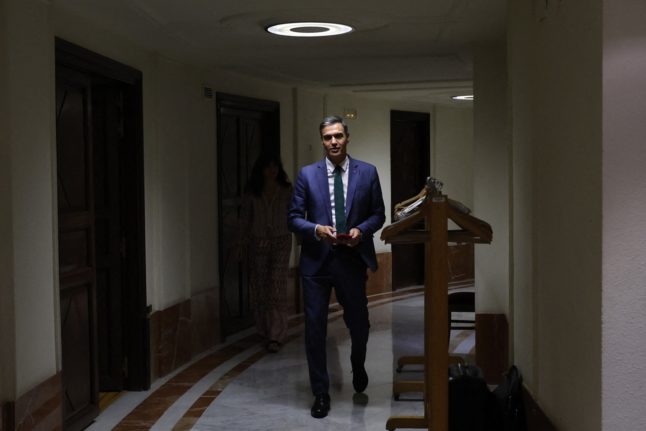The name of Spain’s third city is, officially speaking, València, as it is written in the Valenciano language.
This was changed in 2016 after the then left-wing Compromís government voted to change the city’s official name to its Valencian version as part of broader moves to promote the Valenciano language in the region.
However, a recent proposal to change this back to a bilingual version (‘Valéncia/Valencia) has sparked fierce political and linguistic debate in the city that anchors on a single accent – or a tilde, as it is known in Spanish – and which direction it should be facing.
València vs Valéncia
On Tuesday, a plenary session of the Valencian town hall approved a procedure to change the official name from València to the bilingual version (that is, to Valéncia, with the accent facing the other way, and Valencia in Castillian Spanish) . The modification was pushed by the Valencian right, namely far-right party Vox, who govern in coalition with the centre-right Partido Popular (PP).
Opposition parties including Compromís voted against the proposal.
READ ALSO: 10 maps to help you understand Valencia
Officially changing the name of the city – that is, with a closed tilde as opposed to an open one – may seem like a rather innocuous or uncontroversial change to make. To many foreigners it may be a grammatical change so small that many might not even notice, and it is true that most in Spain (and in Valencia too) refer to the Mediterranean city, in writing at least, simply as ‘Valencia’.
But the city’s Municipal Commission for Social Welfare, Education, Culture and Sports has now agreed to promote the name change and opt for the ‘tancada’ tilde (a closed accent) that faces the other way.
According to a report released by the commission, the change in accent is to ensure “the meaning of the accent would be clear and there would be no confusion”.
This forward or closed accent – as in Valéncia – would follow the Norms of El Puig, the linguistic rules developed by the Royal Academy of Valencian Culture developed to ensure Valencian is treated as an independent language, not a variety of Catalan.
The move has proved controversial. Local Socialist councillor Nuria Llopis noted that Acadèmia Valenciana de la Llengua is the official body that decides linguistic regulations in the region, and added that it issued a report in 2017 in which it pointed out that although “the pronunciation recommended by Valencians is with a closed accent, the appropriate spelling from the historical and linguistic point of view is València with an open accent”.
Compromís spokesman Pere Fuset has suggested that the bilingual form of the name should be avoided because it is not in keeping with the historical and linguistic traditions of the city, and that priority should always be given to local languages, that is to say, the Valencian name for municipalities in the Valencian-speaking areas of the region and the Castilian name for municipalities in the Castilian-speaking areas.
Figures from Compromís have accused Vox and PP of using the name change “as a weapon of self-destruction.” The Socialist spokesperson, Sandra Gómez, claimed that the move is political and speaks to the influence far-right Vox is having on PP in government: “The PP only has one option and that is to back down, stop being dragged by that Vox ultra agenda and make its own decisions,” she said.
In Valencian, the word ‘València’ is considered to have four syllables as the -ia ending does not form diphthong as it does in Spanish. That makes it an esdrújula word (the emphasis is on the antepenultimate syllable and it always has an accent on its vowel). In Castilian Spanish, ‘Valencia’ is a three-syllable llana word (emphasis on last but one syllable, in this case ‘len’) and therefore it doesn’t have an accent.
Spanish doesn’t have open and closed tildes, they always go forward.
READ ALSO: Do I need to learn Valencian if I live in Spain’s Valencia region?
For outsiders, that such political debate could spawn from disagreement about whether an accent should be open or closed or be there at all likely seems symptomatic of the highly politicised nature of Spanish society in recent months (something that is certainly true in part, particularly with the visible role of regional separatist forces in the post-election period) but in reality it also speaks to underlying historic tensions about regional cultures, identities and languages in the country.
Opponents of the move have warned against the castellanización of the Valencian language and culture, and have also pointed to Galician, Basque, and Catalan cities that are officially named in their local language.
Compromís warn that the change “goes against the Statute of Autonomy of the Valencian community and laws from the Acadèmia Valenciana de la Llengua“. Vox deny that the new name contradicts any law on the regional statute books.
READ ALSO: The 2006 Valencia metro crash you’ve probably never heard of



 Please whitelist us to continue reading.
Please whitelist us to continue reading.
Member comments